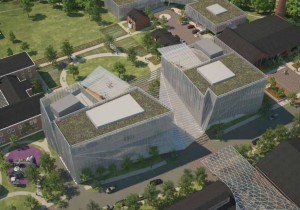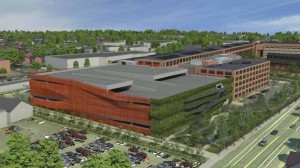
Glass canopies between existing office buildings at the Arsenal on the Charles complex would create a “winter garden” atmosphere under Athenahealth’s campus master plan proposal.
Athenahealth’s master plan for expansion of its 760,000-square-foot Arsenal on the Charles campus in Watertown is full of contradictions.
It’s a 200-year-old site that embraces the latest in Millennial workplace trends. A long-term commitment to a suburban parcel surrounded by strip malls, while other IT companies move to urban centers. A vision for an open campus, in an industry responsible for safeguarding sensitive personal information.
As Athenahealth adds thousands of jobs over the next few years, the digital health
records keeper needs much more room. It’s hired Stantec and Charles Rose Architects to make the pieces fit.
Their assignment: to add workspaces, amenities and 1,200 parking spaces while preserving historic elements and enhancing the public realm.
Silicon Valley-like campuses that envelop employees in a corporate bubble may work wonders for productivity, but Athenahealth is distancing itself from the model as it expands.
“Because it’s part of the country’s history, we wanted to ensure that it really remain as open and permeable as possible,” said Michael Crowley, vice president of the company’s real estate division, athenaEnvironment.“This is really a public treasure that should be enjoyed by not only those of us who come to work here every day, but also the public at large.”
 From the outset, executives wanted to provide more amenities, Crowley said. Nearly 700 surface parking spaces will be torn up to make way for an amphitheater, skating rink, outdoor classrooms and gathering spaces for employees and the public to graze on sloping lawns overlooking the river. Glass canopies will cover alleys between the existing buildings, creating a “winter garden” environment.
From the outset, executives wanted to provide more amenities, Crowley said. Nearly 700 surface parking spaces will be torn up to make way for an amphitheater, skating rink, outdoor classrooms and gathering spaces for employees and the public to graze on sloping lawns overlooking the river. Glass canopies will cover alleys between the existing buildings, creating a “winter garden” environment.
With more restaurants and retailers planned, the existing network of narrow driveways will be redesigned as “shared streets” with room to accommodate vehicles, pedestrians and bicycles.
To replace the surface parking, a new 7-story parking garage would be built at the west end of the property. Vegetated green walls would shroud the structure from Arsenal Street.
Local historic preservation regulations require that new buildings be distinguished from the original architecture, so the new office and retail buildings will have a more contemporary look.
In addition to the green screening, the new parking garage will be clad in a futuristic metal foil skin that reflects the hues of the surrounding brick buildings, said Charles Rose, principal at Somerville-based Charles Rose Architects.
“We’ve gone to great lengths to make it aesthetically pleasing. We’re trying to express the dynamic nature of the company,” he said.
Five new office buildings will range from 2 to 5 stories, and plans include two smaller retail buildings and the parking garage. The redesign will create nearly 3 acres of new open space.
Don’t Call It A Googleplex
The former munitions factory and warehouses were built in phases from 1816 through the early 1900s. The U.S. Army sold the property to the Watertown Redevelopment Authority in 1968. In 2000, a private developer converted the buildings into office space occupied by tech companies and Harvard Business Publishing.
Founded in 1997 by entrepreneur Jonathan Bush, Athenahealth relocated from San Diego to Waltham before settling on the Arsenal property for expansion into 133,000 square feet of office space in 2004. Over the past decade, it’s grown into 250,000 square feet. Tapping into physicians’ demand for outsourcing of billing services, the company is approaching $1 billion in annual revenues.

Nearly 700 surface parking spaces on the Athenahealth campus in Watertown would be replaced with a 7-story garage covered in living walls and metal foil skin under a redevelopment plan.
It bought the 29-acre Arsenal property from Harvard University in 2013 for $168.5 million. As part of a $9.5 million tax incentive package granted by state economic development officials, Athenahealth agreed to add up to 1,900 employees – the company calls them “Athenistas” – over a decade at the Arsenal complex.
The sprawling brick industrial structures at the Arsenal were tailor-made for trendy office trappings: corporate dining halls, lots of exposed ductwork and open-format workspaces ringed by private meeting rooms.
Since taking ownership, Athenahealth has recruited high-profile vendors to generate buzz about the Arsenal in the broader community. Enter Branch Line, a rotisserie-themed gastropub run by the folks behind Kenmore Square’s Eastern Standard, which opened last fall. More retail and restaurant space is planned.
“We’re not like the Googleplex, we’re not like Apple, where you need a keycard access to get on the campus,” Crowley said. “We have security issues like they do. We have higher degrees of security around HIPAA which we have to respect, and yet this campus is still so open to the community.”




 |
| 


